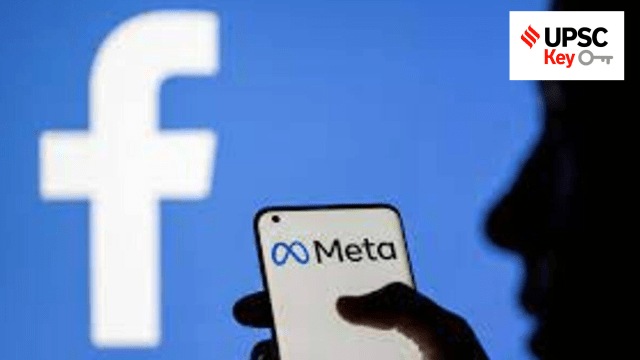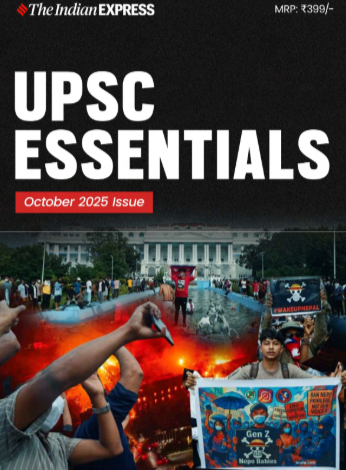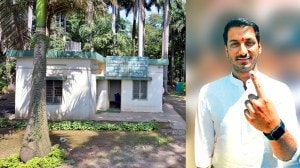Priya Kumari Shukla is a Senior Copy Editor in the Indian Express (digital). She contributes to the UPSC Section of Indian Express (digital) and started niche initiatives such as UPSC Key, UPSC Ethics Simplified, and The 360° UPSC Debate. The UPSC Key aims to assist students and aspirants in their preparation for the Civil Services and other competitive examinations. It provides valuable guidance on effective strategies for reading and comprehending newspaper content. The 360° UPSC Debate tackles a topic from all perspectives after sorting through various publications. The chosen framework for the discussion is structured in a manner that encompasses both the arguments in favour and against the topic, ensuring comprehensive coverage of many perspectives. Prior to her involvement with the Indian Express, she had affiliations with a non-governmental organisation (NGO) as well as several coaching and edutech enterprises. In her prior professional experience, she was responsible for creating and refining material in various domains, including article composition and voiceover video production. She has written in-house books on many subjects, including modern India, ancient Indian history, internal security, international relations, and the Indian economy. She has more than eight years of expertise in the field of content writing. Priya holds a Master's degree in Electronic Science from the University of Pune as well as an Executive Programme in Public Policy and Management (EPPPM) from the esteemed Indian Institute of Management Calcutta, widely recognised as one of the most prestigious business schools in India. She is also an alumni of Jamia Milia Islamia University Residential Coaching Academy (RCA). Priya has made diligent efforts to engage in research endeavours, acquiring the necessary skills to effectively examine and synthesise facts and empirical evidence prior to presenting their perspective. Priya demonstrates a strong passion for reading, particularly in the genres of classical Hindi, English, Maithili, and Marathi novels and novellas. Additionally, she possessed the distinction of being a cricket player at the national level. Qualification, Degrees / other achievements: Master's degree in Electronic Science from University of Pune and Executive Programme in Public Policy and Management (EPPPM) from Indian Institute of Management Calcutta ... Read More
UPSC Key-January 6, 2023: Learn about interstate water disputes, aspirational blocks programme, and impact of savings
Exclusive for Subscribers from Monday to Friday: The Indian Express UPSC Key January 6, 2023 will help you prepare for the Civil Services and other competitive examinations with cues on how to read and understand content from the most authoritative news source in India.
 UPSC Key 2023: Here's what you should be reading from the January 6, 2023 edition of The Indian Express. (REUTERS/FILE)
UPSC Key 2023: Here's what you should be reading from the January 6, 2023 edition of The Indian Express. (REUTERS/FILE)Important topics and their relevance in UPSC CSE exam for January 6, 2023. If you missed the January 5, 2023 UPSC key from the Indian Express, read it here
FRONT PAGE
New UGC norms: Foreign universities can set up campus, decide fee, repatriate funds
Syllabus:
Preliminary Examination: Indian Polity and Governance-Constitution, Political System, Panchayati Raj, Public Policy, Rights Issues, etc.
Mains Examination: General Studies II: Government policies and interventions for development in various sectors and issues arising out of their design and implementation.
Key Points to Ponder:
• What’s the ongoing story- FOREIGN universities can set up their campuses in India, decide their admission process, fee structure, and will also be able to repatriate funds to their parent campuses according to draft norms announced by the University Grants Commission (UGC) chairperson M Jagadesh Kumar here Thursday.
• UGC (Setting up and Operation of Campuses of Foreign Higher Educational Institutions in India) Regulations 2023-Know the highlights
• What New Education Policy 2020 says about Setting up and Operation of Campuses of Foreign Higher Educational Institutions in India?
• What are the salient features of New Education Policy 2020?
• How National Policy on Education (NEP) 2020 and Sustainable development goals are linked?
• “The operation of Foreign Higher Educational Institutions shall not be contrary to the sovereignty and integrity of India, the security of the State, friendly relations with foreign States, public order, decency, or morality”-Discuss
• Growth of Education in India: Historical Background from Vedic Period to British Period
• Growth of Education in the Post-Independence Period-Reforms taken so far
• Education was initially a state subject but following an amendment (42nd) to the Constitution in 1976, it became a concurrent subject-True or False?
• Constitutional Provisions Regarding Education- What Article 28, Article 29, Article 30, Article 21A, Article 45 and Article 46 says about Education?
• Education System in India-Know the Present Structure from Pre-primary level to Primary or elementary Level (Sarva Shiksha Abhiyan) to Secondary level (Rastriya Madhyamik Shiksha Abhiyan) to Higher education (Rastriya Uchhattar Shiksha Abhiyan)
• So premium institutes like Oxford and Cambridge can come to India under the UGC (Setting up and Operation of Campuses of Foreign Higher Educational Institutions in India) Regulations 2023?
• The repatriation of funds and other cross-border movement of funds shall be governed by which act?
Other Important Articles Covering the same topic:
📍Foreign universities operating in India not allowed to hold online classes: UGC Chief
SC stays Haldwani eviction order: Can’t uproot 50,000 within 7 days
Syllabus:
Preliminary Examination: Economic and Social Development-Sustainable Development, Poverty, Inclusion, Demographics, Social Sector Initiatives, etc.
Mains Examination:
• General Studies I: Urbanization, their problems and their remedies.
• General Studies II: Issues relating to development and management of Social Sector/Services relating to Health, Education, Human Resources.
Key Points to Ponder:
• What’s the ongoing story- The Supreme Court on Thursday stayed the Uttarakhand High Court direction to forthwith evict people living on land claimed by the railways in Haldwani saying they cannot be uprooted overnight and some rehabilitation scheme is necessary for those claiming legal rights in the land.
• Quick Recall- On December 20 last year, the Uttarakhand High Court directed the Railways to evict those living in Haldwani’s Gafoor Basti, land adjoining the Haldwani railway station. The decision by Justices Sharad Kumar Sharma and Justice Ramesh Chandra Khulbe came in a public interest litigation (PIL) filed in 2013. The petitioner had moved court against illegal mining in the area after a bridge collapse, but the HC expanded the scope of the petition.
• What was the HC decision?
• What is the land dispute?
• What is the claim by the residents?
• How did the HC decide in favour of Railways?
• What Supreme Court said on Uttarakhand HC ruling?
• How did the case reach the Supreme Court?
• What is land encroachment?
Other Important Articles Covering the same topic:
📍Haldwani case: How did the Uttarakhand HC arrive at its ruling?
📍SC order in Haldwani case: What the apex court said on Uttarakhand HC ruling
GOVT & POLITICS
PM: Water should be a subject of cooperation between states
Syllabus:
Preliminary Examination: Indian Polity and Governance-Constitution, Political System, Panchayati Raj, Public Policy, Rights Issues, etc.
Mains Examination: General Studies II: Functions and responsibilities of the Union and the States, issues and challenges pertaining to the federal structure, devolution of powers and finances up to local levels and challenges therein.
Key Points to Ponder:
• What’s the ongoing story-Observing that the subject of water comes under the control of the states in the Constitution, Prime Minister Narendra Modi Thursday said that it was the responsibility of all to make water a subject of collaboration, coordination, and cooperation between states. Addressing the opening session of first All India Annual State Ministers’ Conference on Water via video message, PM Modi said, “It is the states’ efforts for water conservation that will go a long way in achieving the collective goals of the country”.
• 1st All India Annual State Ministers Conference on Water- Know the Key Points
• Why is the All India Annual State Ministers Conference on Water being held?
• In what way do the Prime Minister’s remarks at the two-day conference assume significance?
• What does the Indian Constitution say about the water?
• What is interstate water dispute?
• Interstate water dispute-give some example
• What are the major causes of conflicts over water?
• How many interstate water disputes Tribunal are there in India?
• The resolution of water dispute is governed by which act?
• Inter-State River Water Disputes (ISRWD) Act, 1956-Know the highlight
Other Important Articles Covering the same topic:
Building blocks: Govt set to launch scheme tomorrow on lines of aspirational dists
Syllabus:
Preliminary Examination: Indian Polity and Governance-Constitution, Political System, Panchayati Raj, Public Policy, Rights Issues, etc.
Mains Examination: General Studies II: Government policies and interventions for development in various sectors and issues arising out of their design and implementation.
Key Points to Ponder:
• What’s the ongoing story- The Centre is set to launch the Aspirational Blocks Programme (ABP), a new initiative on the lines of the Aspirational District Programme, it is learnt.
• What is the Aspirational District Programme?
• How the Aspirational Blocks Programme (ABP) will be different from Aspirational District Programme?
• What is the rationality behind Aspirational Blocks Programme (ABP)?
• What will be the key features of Aspirational Blocks Programme (ABP)?
Other Important Articles Covering the same topic:
📍Niti Aayog’s Aspirational Districts Programme is a laboratory for governance reform
EXPLAINED
Interest rate hike for small savings schemes: Implications, concerns
Syllabus:
Preliminary Examination: Economic and Social Development-Sustainable Development, Poverty, Inclusion, Demographics, Social Sector Initiatives, etc.
Mains Examination: General Studies III: Indian Economy and issues relating to planning, mobilization, of resources, growth, development and employment.
Key Points to Ponder:
• What’s the ongoing story- Amid rising yields on government securities, the Finance Ministry last week hiked the interest rates for some small savings schemes by 20-110 basis points for the January-March quarter. While the hike will serve as protection against high inflation and interest rates, the small savings rates are still below desired levels.
• Why saving is important for the economy?
• What is the household savings rate?
• What is interest rate on savings?
• Which sector is the largest contributor to savings in the economy?
• Where does the Indian household invest?
• What is the current state of household savings?
• The hike in small savings rates-Know the background
• “Coming amid a higher inflation rate and a rising interest rate cycle, the hike in small savings rate is seen as necessary to protect savers, especially senior citizens”-Why?
• “Interest rates on small saving schemes are reset quarterly, in line with the movement in benchmark government bonds of similar maturity”-Why
• Are the hikes enough?
• What does it mean for savers?
Other Important Articles Covering the same topic:
📍What investors should keep in mind in 2023
Reading the junta’s poll promise
Syllabus:
Preliminary Examination: Current events of national and international importance.
Mains Examination: General Studies II: India and its neighbourhood- relations
Key Points to Ponder:
• What’s the ongoing story-On Wednesday, Myanmar’s military ruler, Senior General Min Aung Hlaing, declared that his regime would hold “free and fair elections”. He did not say when, but it is believed he meant this year. The General made the remarks as the junta observed the 75th anniversary of Myanmar’s freedom from British rule, and three weeks ahead of the second anniversary of the military coup in the country. The military take-over had come hours ahead of the opening day of Parliament on February 1, 2021, after Myanmar’s biggest and most popular political party, National League for Democracy (NLD), swept the 2020 elections.
• Who is Myanmar junta?
• Who is in charge of Myanmar now?
• For Your Information-Myanmar has remained in violent turmoil since the military takeover as battles rage between pro-democracy forces and the military. Days after the coup, many new parliamentarians organised themselves into the National Unity Government (NUG) and launched what they called a “spring revolution”.
• Do You Know-India, shares a 1,643 km-long border with Myanmar, stretching from the India-Myanmar-China trijunction in Arunachal Pradesh to the India-Myanmar-Bangladesh trijunction at Mizoram.
• What International organisations is Myanmar part of?
• Know India-Myanmar bilateral relations in detail
• Why is Myanmar important for India?
• Since coup in Myanmar, How India has taken diplomatic approach on Myanmar?
Other Important Articles Covering the same topic:
📍India, China, Russia abstain on first UNSC resolution on Myanmar in 74 years
📍Why India must engage with Myanmar
THE IDEAS PAGE
Syllabus:
Preliminary Examination: General issues on Environmental ecology, Bio-diversity and Climate Change – that do not require subject specialization.
Mains Examination: General Studies III: Conservation, environmental pollution and degradation, environmental impact assessment.
Key Points to Ponder:
• What’s the ongoing story- Rajat Gupta and Naveen Unni write: India needs imagination, realism, determination — and a sense of urgency. We must take steps this decade to set things up, establish momentum
• ‘India’s per capita emissions are relatively low (1.8 tons of CO2e per person), but we are still the world’s third-largest single emitter’-How?
• What is net zero?
• Why is net zero important?
• How can net zero be achieved?
• Is there a global effort to reach net zero?
• Are we on track to reach net zero by 2070?
• Difference between ‘Net Zero’ and ‘Carbon Neutral’?
• How can net zero be achieved?
• Public-Private partnership frameworks to achieve ‘net zero’-issues and challenges
• India’s emission Status-Present Scenario
• What is India’s long-term strategy towards a low-carbon development?
• What Vision India presented in COP27 net-zero target?
• “Developing countries must not be asked to continuously upgrade their climate actions, and any further measures required to meet the global goals of keeping temperature below 1.5 degree Celsius must come from the developed countries alone”-decode and discuss
• Do You Know-India’s emissions are set to grow from 2.9 GtCO2e a year to 11.8 GtCO2e in 2070. Nor will it come without cost. According to a recent McKinsey report, effective decarbonisation, down to 1.9 GtCO2e by 2070, would require India to spend a total of $7.2 trillion on green initiatives by 2050. This “line of sight” (LoS) scenario is based on announced policies and expected technology adoption. Deeper decarbonisation — an “accelerated scenario” that would reduce emissions to just 0.4 GtCO2e by 2050, or close to net zero — would require $12 trillion in total green investments by 2050. Under this scenario, India could create 287 gigatonnes (GT) of carbon space for the world, almost half of the global carbon budget, for an even chance at limiting warming to 1.5 degrees Celsius.
• What is decarbonisation?
• “Decarbonisation will drive many changes, from how we source energy to how we manufacture materials; from how we grow food to how we move around; from how we treat waste to how we use our land”-Discuss
• How an orderly transition to net zero could help India decarbonise while creating an engine for growth?
Other Important Articles Covering the same topic:
ECONOMY
The EU privacy breach ruling and its impact on Meta
Syllabus:
Preliminary Examination: Current events of national and international importance.
Mains Examination: General Studies II: Effect of policies and politics of developed and developing countries on India’s interests
Key Points to Ponder:
• What’s the ongoing story-Facebook’s parent company Meta has been slapped with two sets of fines totalling €390 million as the Irish privacy regulator concluded that the company’s advertising and data handling practices were in breach of the EU’s overarching privacy law. The Irish Data Protection Commission said on Wednesday (January 4) that Meta should be ordered to pay two fines — a €210 million fine over violations of the EU’s General Data Protection Regulation (GDPR), and a €180 million fine linked to breaches of the GDPR by Instagram.
• But why Facebook’s parent company Meta has been slapped with two sets of fines totalling €390 million?
• What Irish Data Protection Commission (DPC) said?
• Why did the ruling come from the Irish regulator?
• What is the Significance of the ruling?
• What will be the Impact of the ruling?
• What is European Union’s General Data Protection Regulation (GDPR)?
• European Union’s General Data Protection Regulation (GDPR) and United Kingdom’s Data Protection Act, 2018-Compare
and contrast
Other Important Articles Covering the same topic:
📍Irish privacy regulator fines Meta more than $400 mln
For any queries and feedback, contact priya.shukla@indianexpress.com
The UPSC KEY Indian Express is now on Telegram. Click here to join our channel and stay updated with the latest Updates.
UPSC Magazine

Read UPSC Magazine



- 01
- 02
- 03
- 04
- 05





























